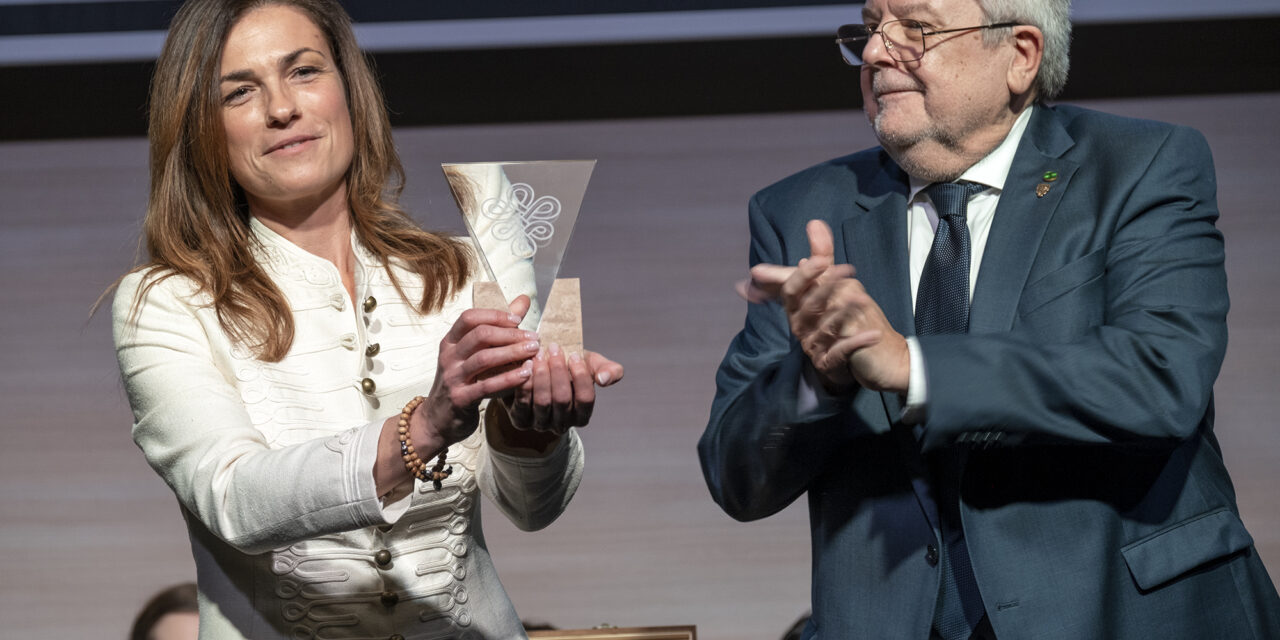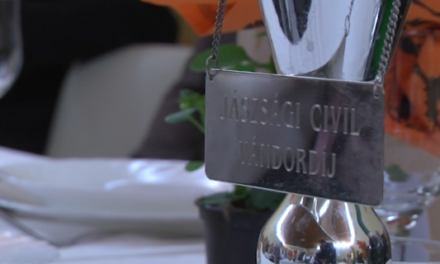The CÖF-CÖKA community thanked Dr. Judit Varga for the self-sacrificing and effective work she did in the service of our country as a minister and as the president of the European Affairs Committee of the Parliament with an intellectual patriot award. Constitutional lawyer Dr. Zoltán Lomnici Jr., the spokesperson of the NGO, praised her commendable activities as both a mother of a family and a politician, and you can now read the text of the eulogy.
"The future will demand sacrifices from us, which we must make, but there are two things that cannot be sacrificed under any circumstances: the independence of the homeland and honor" . The eternal principle laid down by Ferenc Deák for posterity, in addition to accompanying the sacrificial work of our awardee for Hungary from the very beginning, is also highly relevant in the domestic and foreign political reality of the present and the future, when our country not only outside the country's borders, but also within it, it must constantly fight for its sovereignty.
Judit Varga is the mother of three children. He was born in Miskolc, and these roots were a defining part of his identity throughout his life. After his high school years, he continued his legal studies at the Faculty of State and Law of the University of Miskolc, where he gained insight into the everyday life of international organizations as a young law student, since in 2001 he was elected vice-president of the European Law Students Association (ELSA) in Miskolc. Between 2002 and 2004, he earned the Republic scholarship based on his academic results. Already in 2004, as an Erasmus scholarship student studying in Germany, one of the local professors suggested to him that he should apply for a job in Brussels. However, this did not happen at the beginning, since after obtaining his diploma, he headed towards the career of a lawyer and then a judge. As a young lawyer, he founded the Don't Be Afraid Foundation, which provided assistance to the victims of police violence that crushed the 2006 protests.
From 2009, he worked for nine years in the European Parliament as a political consultant, where for three years he was a member of the team of János Áder, Member of the European Parliament and later President of the Republic. Looking back, it is a strange turn of fate that during the recruitment interview he turned to President Áder saying that "I would be happy to become a legal advisor, as long as I don't have to deal with politics".
During the years spent in Brussels and Strasbourg, he gained detailed knowledge of the functioning of the European Union's institutional system and legislation. In this regard, he expressed his disappointment: "as a lawyer, I lost my illusions day by day regarding the accession scenario of Brussels politics....I suffered a lot of small disappointments, especially compared to the perfect image of European decision-making imagined in the legal examination, idealized in textbooks. During university, a law student learns that the EU loves and respects all member states equally [...], but the reality is that EU policy is fundamentally based on a battle of rock-hard economic interests, in which cold calculation and the principle of the stronger necessarily prevail". At the same time, as he added, he still considers these years useful, because they taught him that EU work is about promoting Hungarian interests, and for him "protecting the honor of the homeland comes from within".
In 2018, he was appointed State Secretary responsible for European Union relations. In this assignment, he participated in the development of the government's legal argument system, which sought to refute the allegations of the politically biased Sargentini report, which casts doubt on the Hungarian rule of law, and later represented the Hungarian government in the disputes of the Article 7 procedure. In recognition of his work, he was appointed Minister of Justice in July 2019 on the recommendation of Prime Minister Viktor Orbán.
He won a parliamentary mandate in the 2022 parliamentary elections, which brought the historic electoral victory of the national side, and the prime minister counted on his expertise in the fifth Orbán government.
Throughout his tenure as minister, he waged a determined struggle to protect the sovereign competences of the member states, against stealthy EU legislation and attempts to intrude on Hungary's ability to act, stressing that there are issues (e.g. migration or family) in which no one can ever decide for the Hungarians. In the matter of Hungarian self-determination, he designated clear and inviolable boundaries for EU institutions and bureaucrats.
In addition to the continuous intellectual resistance to attacks that seek to undermine Hungary's sovereignty and judgment, he is credited with, among other things, the historic salary increase for judges and prosecutors in the judiciary. He achieved indisputable results in the area of family law legislation, in order to strengthen the rights of children and families, all in close cooperation with the civil sphere and law enforcement officers. Under his leadership, the national network of victim assistance was (almost) fully developed. Last but not least, Hungary was able to make great progress in the conditionality procedure with its management.
It can be stated without exaggeration that the upcoming European Parliament elections will be the most important and historically significant contest of the EU-level democratic competition held since our accession. The past few years have clearly demonstrated that the left-liberal leadership of the union is not able (nor does it necessarily want to) respond to emerging crises properly, keeping in mind the interests of the European continent. While the progressive bureaucracy in Brussels is repeatedly trying to undermine the sovereignty of nation-states by circumventing the Basic Treaties, or is busy with other issues incompatible with the laws of nature, Europe's competitiveness is constantly deteriorating.
And if all this were not enough, as a result of the series of abuses and scandals, European citizens have also lost their remaining trust in the EU institutional system. All over Europe, you can feel the feeling that the time has come for a pan-European conservative turn. It fills me with great reassurance that Dr. Judit Varga, President of the European Affairs Committee of the Parliament, and leader of the 2024 European Parliament list of Fidesz-KDNP, is at the head of this historically important work from the Hungarian side.
"If the smaller nations are not warned against being swallowed up by the great powers, there will be no freedom, no peace in Europe, there will only be ambitions, striving for predominance on the one hand, and perpetual conspiracies on the other," are the warning words of Lajos Kossuth.
Just as Madam President at the IV held in November 2023. In his speech at the EuCET conference, he said: national sovereignty is a condition for citizens' freedom, but it also means the survival of European integration. The most important element of the common conservative goals of the European Parliament elections is that instead of an empire, a strong alliance of sovereign states is needed. European sovereignist forces must lead Europe back to the path of common sense, because the European Union has deviated from its original path.
Since 2016, the Civil Solidarity Forum – Civil Solidarity Nonprofit Foundation (CÖF-CÖKA) has been awarding the Intellectual Patriot Award to those civil and public figures who do outstanding work to protect and enforce our national interests. It is a great honor for me to announce that, in accordance with the decision of the foundation's board of trustees, one of the recipients of the Spiritual Patriot Award this year, in recognition of her merits and – especially in defense of Hungarian national sovereignty – is Representative Dr. Judit Varga, the President of the European Affairs Committee of the Parliament, the Leader of the 2024 European Parliament list of Fidesz-KDNP.
Dr. Zoltán Lomnici Jr
Cover photo: civilek.info












